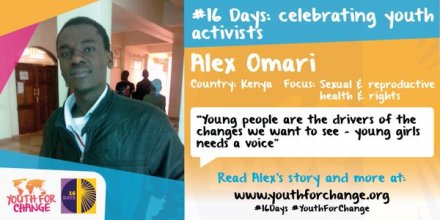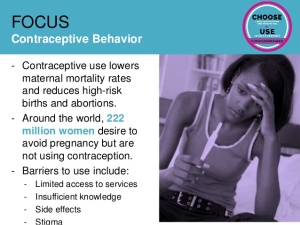Research and E-health
LARCs
Preventing unintended pregnancy among young women in Kenya: Prospective cohort study to offer contraceptive implants
Courtesy of:
David Hubacher ; Alice Olawo ; Carolyne Manduku ; James Kiarie ; Pai Lien Chen
Teenage Pregnancy Burden
#Teenagers should be Listening to School Bells Ring NOT Wedding Bells!!!!
By Alex Omari
Reproductive health concerns of adolescents have received increasing international attention in recent years. Early childbearing is linked to a number of undesirable health outcomes such as risk of death, pregnancy-related illnesses, abortion, infertility and exposure to sexually transmitted diseases including human immunodeficiency virus/acquired immunodeficiency syndrome . Female adolescents, compared to their male counterparts, face disproportionate health concerns due to teenage pregnancies.
Although sexual activity among the adolescents is widespread around the world, the determinants and consequences are likely to vary from one region to another. Early pregnancies are more pronounced in Sub-Saharan African (SSA) countries, most of which experience high levels of poverty. Due to the differences in socio-economic as well as cultural backgrounds, the results from a developing country like Kenya are likely to differ from those based on experiences of the richer, industrialized nations. For instance, given limited resources in rural areas, girls are forced to drop out of school or get married at an early age. In addition, inability to meet basic and personal material needs makes teenage girls susceptible to pre-marital sex. Such factors are likely to predispose them to unwanted pregnancies.
In Kenya, teenage pregnancy is not only as a reproductive health issue, but is also a multi facet issue as it directly affects the current and future socio-economic well-being of women. Early childbearing deny girls the opportunity to complete education and the ability to acquire human capital skills which are critical in the labour market. Given the absence of welfare benefits and child support, teenage pregnancies lead to increased dependency, and are likely to perpetuate poverty and low status of women. The relatively high levels of poverty and with the HIV/AIDS pandemic being toll order among the Kenyan youth, teenage pregnancies pose a serious policy problem.
Even though teenage pregnancies are viewed as one of the major hindrances to girl’s education in Kenya, there has been little effort in critically evaluating the underlying determinants. And by the fact that interest in fertility studies and policies has largely focused on adults, less attention has being accorded to adolescents.
Despite its implications, empirical studies on causes of teenage pregnancies in the context of
African countries are scanty. More often, teenage pregnancy is mentioned merely as one of the consequences of the high-risk sexual behavior
Peanuts may reduce risk of death, heart disease

Eating peanuts, in small amounts, may reduce the risk of mortality, especially death from cardiovascular disease, a new study Monday showed.The report compiles research from people of varying races, including Caucasians, African Americans and Asians, all from low income backgrounds.
Researchers found that consuming peanuts regularly reduced mortality among men and women from all groups, and suggests that eating the nuts — which are relatively affordable — can be an inexpensive and nutritious way to reduce mortality and cardiovascular disease around the world.
The study, published in the Journal of the American Medical Association, Internal Medicine includes more than 70,000 Caucasians and blacks in the United States and some 130,000 Chinese people in Shanghai.
“We found that peanut consumption was associated with reduced total mortality and cardiovascular disease mortality in a predominantly low-income black and white population in the US, and among Chinese men and women living in Shanghai,” said senior author Xiao-Ou Shu, associate director for Global Health at the Vanderbilt-Ingram Cancer Centre (VICC).
There was a reduced risk of total mortality of in 17 to 21 percent of participants, the study showed.
RISK SLASHED
The risk of death from cardiovascular disease was slashed by between 23 and 38 percent.
But co-author William Blot warned that because the data was from observational epidemiological studies and not randomized clinical trials, “we cannot be sure that peanuts per se were responsible for the reduced mortality observed.”
“The findings from this new study, however, reinforce earlier research suggesting health benefits from eating nuts, and thus are quite encouraging,” added Blot, who is also associate director for cancer prevention control and population-based research at VICC.
Peanuts are less expensive and more widely available than many other nuts, and are eaten by many cultures around the world.The nutritious nuts — which are actually legumes — are high in and unsaturated fat, fibre, vitamins, and anti-oxidants and can boost cardiovascular health with as little as 30 grams eaten weekly.
“The results suggest that including a modest amount of nuts as part of a well-balanced diet may be of benefit,” said Peter Weissberg, director of the British Heart Foundation, who did not participate in the study.
“The data do not show that the more peanuts you eat the lower the risk of a fatal heart attack, so people should not start eating large quantities of nuts, particularly salted nuts, in the hope that it will protect them from heart disease,” he added.
Previous research has focused on white upper class research subjects.The participants in this latest study were observed for between five and 12 years.
Courtesy of AFP (Agence France-Presse)- an international news agency headquartered in Paris.The oldest news agency in the world and one of the largest.
The link between Hormonal Contraceptive use and HIV/AIDS.
By Alex Omari
Media across the globe has been on tabs regarding a recent study that was conducted, suggesting that women who use hormonal contraceptives (injectables), are at an increased risk of becoming infected with HIV and transmitting HIV to partners and others. The big questions that begs is ” is there is enough justifiable evidence available to change our messaging to women about hormonal contraceptives” Hormonal injectables i.e Depo-Provera,Noristat contain only progesterone hormone and are administered once every three and two months respectively.
Study Results The study found that HIV-negative women in Eastern and Southern Africa who used Depo-Provera were two times more likely to become infected with HIV, compared to women who did not use Depo-Provera. The study also found that HIV-positive women who used Depo-Provera were two times more likely to pass HIV on to their partners.
Increased risk of HIV transmission through Hormones Laboratory results suggested that progesterone can cause changes to the vaginal lining, which may increase a woman’s susceptibility to HIV infection. In other words, progesterone can decrease the thickness of the vaginal lining, making it easier for HIV to cross the lining and enter the bloodstream. Research also shows that progesterone can increase the amount of virus (or viral load) in the vaginal fluid of women living with HIV. This may explain why women living with HIV who use hormonal contraceptives appear more likely to transmit HIV to others.
Contradictory Results Although this recent study—and others—suggests that hormonal contraceptives increase the risk of HIV transmission, other studies have found that hormonal contraceptives did not increase the risk of HIV infection. Of those studying Depo-Provera, five studies suggest that it increases the risk of HIV infection among HIV-negative women, while seven others did not. Of the studies looking at birth control pills, only two have suggested that birth control pills increase the risk of HIV infection, while 10 others have not. The recently completed study was the first to suggest that Depo-Provera may increase the risk of an HIV-positive woman transmitting HIV to her partner(s).
Difficult to make any conclusions The conflicting evidence makes it difficult to come to definite conclusions about the relationship between using hormonal contraceptives and an increased risk of becoming infected with HIV and transmitting HIV to others. Further, none of the completed studies were randomized controlled trials (RCTs), which means that it is difficult to know for sure whether or not hormonal contraceptives increased the risk of transmission among women. For example, women using hormonal contraceptives may be more likely to share characteristics that put them at a higher risk of becoming infected with HIV or transmitting HIV, such as having more sexual partners or using fewer condoms. Also, most of the completed studies did not confirm whether women who reported using hormonal contraceptives actually used them.
The verdict The evidence investigating the link between hormonal contraceptives and HIV transmission is inconsistent and limited. Consequently, the question of whether hormonal contraceptives increase the risk of HIV transmission remains unanswered and may require further research. Women using contraceptives to reduce their chances of becoming pregnant may want to consider the use of condoms to reduce the risk of becoming infected with HIV or STIs (or transmitting HIV if they are HIV-positive).
Courtesy of James Wilton
Connect via Twitter : @alexomari1



You must be logged in to post a comment.